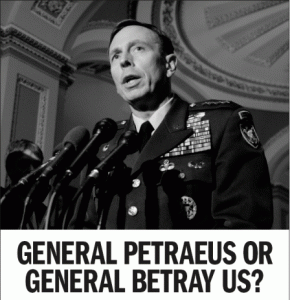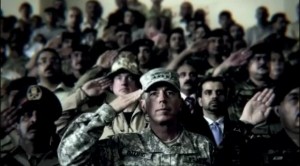Of all the stories reporting David Petraeus’ pushback on the Benghazi story, WSJ’s was clearly the most thorough.
But I want to question this claim.
The significance of the annex was a well-kept secret in Benghazi. A neighbor said that he never saw Libyan security guards at the annex compound and that the street never had any extra police presence or security cordon. “If the CIA was living there, we never knew it,” the neighbor said.
The comment is part of the CIA’s partial disclosure about its activities in Benghazi, which makes it clear that the Benghazi presence was really a CIA operation with a diplomatic face.
The spy agency was the first to set up shop. It began building up its presence there soon after the Libyan revolution started in February 2011. The uprising overturned what had been a tight working relationship between the Gadhafi regime’s spy services and the Americans, creating a gap that the CIA presence sought to fill, officials said.
The CIA worked from a compound publicly referred to as the “annex,” which was given a State Department office name to disguise its purpose. The agency focused on countering proliferation and terrorist threats, said an American security contractor who has worked closely with CIA, the Pentagon and State. A main concern was the spread of weapons and militant influences throughout the region, including in Mali, Somalia and Syria, this person said.
Libyan officials say they were kept in the dark about what the CIA was doing in Benghazi. “The Americans had people coming and going with great frequency. Frankly, our records were never clear [about] who was out there” in Benghazi, said a senior Libyan government official in Tripoli.
In mid-2011, the State Department established its consulate in Benghazi, to have a diplomatic presence in the birthplace of the Libyan revolution. At the annex, many of the analysts and officers had what is referred to in intelligence circles as “light cover,” carrying U.S. diplomatic passports.
All this “transparency” about what the spooks were doing in Benghazi appears designed to show why CIA prioritized the Annex over the Mission compound the night of the attack.
But I don’t buy the claim that the Libyans were as clueless about the spooks’ presence as this story suggests.
This July 2012 review of security incidents in the last two years (see PDF 67-117, particularly 89 and 99-100) describes two events this year in which people who appear to have been tied to CIA’s mission were harassed by militias.
First, on February 19, two women described as “Mission personnel” but not by rank were stopped late at night in a “hastily crafted checkpoint” on their way back from the airport.
U.S. Mission personnel were detained by militia personnel after they drove through a previously unknown and hastily crafted checkpoint in Benghazi. The Mission vehicle and personnel were returning from Benghazi’s Benina airport at approximately 0100 hours. The Mission vehicle was pursued and stopped by a militia vehicle and additional militia personnel arrived at the site after the Mission vehicle was stopped. The two female Employees in the vehicle identified themselves as U.S. diplomats by referring to their vehicle license plate, diplomatic placard, and Ministry of Foreign Affairs ID card but were still prevented from leaving. The one English speaking militia member at the checkpoint demanded to see their passports and to inspect their cargo. Mission personnel refused access to the vehicle and its cargo. The detained employees contacted Mission security personnel and 17 Feb Martyrs Brigade QRF members, who responded to the checkpoint and were able to resolve the situation with the checkpoint commander.
Then, on April 27, two South African contractors working on US funded disarmament projects were kidnapped, interrogated, then released.
Two South African nationals, in Libya as part of a U.S. funded weapons abatement, UXO removal, and demining project, were detained at gunpoint while walking in a residential area. At approximately 0630 hrs, a Ford sedan passed the two men while they were walking, turned around and returned to where the men were, and a soldier with an AK series assault rifle exited the vehicle. The soldier directed them to get into the vehicle. The soldier took one of the South African’s company ID, read the Arabic version on the back of the ID card, and examined the passport and visa. The two South Africans were driven to a house at high speed, where the soldier crashed the gate open with his vehicle. A second militia member wearing a hood and armed with an AK47, entered the vehicle, and questioned the two expatriates regarding their nationality, employer, and purpose for being in Libya. The vehicle departed the residential building at high-speed but stopped in order for the militia members to blindfold the two South Africans. The South Africans were then driven to a second property where a third, unidentified person joined the first two militia members. The milita members reviewed the passports, employer ID cards, and appeared to be discussing next steps. The milita members returned the South Africans’ documents and cards and then drove them back to the initial point where they were directed into the vehicle. The South Africans’ [sic] remained blindfolded until they were brought to the initial pick-up point. The milita members told the South Africans’ [sic] that they were detained “for their own safety”, shook hands with the South Africans’ [sic] and allowed them to return to their residence. The incident lasted for approximately 2 hours.
FWIW, the women appear spookier than the South Africans; after all, demining is more danger-work than analysis (indeed, it could be State or DOD funded), and State’s silence about what the women do is suggestive by itself. (Darrell Issa listed the South African’s kidnapping in his first letter to Hillary Clinton on Benghazi but not the women’s questioning, though that list was only intended to go back six months).
Both incidents appear to have been designed to let American-tied personnel know that militias were aware of their presence and movements. That attention may have had to do with the South Africans’ unspecified race (particularly if they are white) and the women’s gender and late night travels. And the militia members may have had no clue of any tie with CIA, assuming one exists. Furthermore, even if they were tracking these individuals, there’s no guarantee the militias knew where the Annex was (though it would presumably make it easy to find out).
But these incidents read to me like deliberate attempts to let Americans know they were being surveilled. Add in the repeated assertions on the part of Libyans who helped protect Americans the night of the attack that the Annex attack included pre-stationed weapons, and it seems like at least some of the militia were tracking CIA’s activities for months leading up to the attack.


